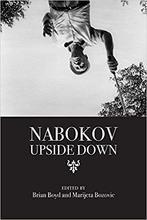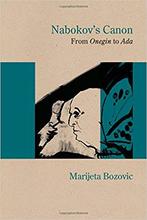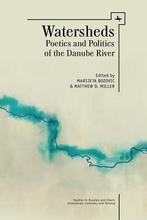Marijeta Bozovic, on leave
Ph.D. Russian Literature, Columbia, 2011
B.A. History and Literature, Harvard, 2002
Interests:
I am an Assistant Professor in Slavic Languages and Literatures, affiliated with Film and Media Studies and Women’s, Gender, and Sexuality Studies at Yale University.
I am a specialist in twentieth- and twenty-first-century Russian and East European literatures and cultures, with broad comparative interests. Within modernist and contemporary cultural studies, I focus on diasporas and transnational cultures; avant-gardes, politics, and poetics; translation and remediation; Danube River and Black Sea studies; digital humanities, new media, and cultural networks.
All of my projects share a fundamental commitment to the study of transnational cultural flow, though the topics range from Vladimir Nabokov’s English-language novels to Danube River and Black Sea studies, Russian political poetry, and international cultural and political networks. I study moments and movements that draw from local as well as global exchanges, and am particularly interested in canon formation, cultural capital and its geographical distributions—embodied in several different genres, media, and languages. I try to make as much of my work freely available online as possible.
I am the Associate Editor of ASAP/Journal; co-editor of Russian Literature; co-curator of the “Poetry after Language” colloquy for Stanford University’s ARCADE digital salon; and a contemporary film and literature reviewer for The Los Angeles Review of Books.
Selected Publications:
Books and special journal issues:
Nabokov’s Canon: From Onegin to Ada. Northwestern University Press; Harriman Institute series, 2016.
Nabokov Upside Down. Eds. Brian Boyd and Marijeta Bozovic. Northwestern University Press, 2017.
Watersheds: Poetics and Politics of the Danube River. Eds. Marijeta Bozovic and Matthew Miller. Academic Studies Press, 2016.
Red on Brown, Brown on Red: Politically Engaged Art and Critical Theory After State Socialism. Eds. Marijeta Bozovic and Marta Figlerowicz. Special issue, Social Text (forthcoming in 2019).
Digital Humanities and Russian and East European Studies. Ed. Marijeta Bozovic. Special double issue, Russian Literature (forthcoming in 2019).
Articles:
“Contemporary Movements” and “The Internet.” In The New Cambridge History of Russian Literature. Eds. Simon Franklin, Rebecca Reich, and Emma Widdis. Cambridge University Press, planned 2020.
“The Voices of Keti Chukhrov: Radical Poetics after the Soviet Union.” Modern Language Quarterly (2019).
“The Transnational Vladimir Nabokov, Or, The Perils of Teaching Literature.” In Transnational Russian Studies. Eds. Andy Byford, Connor Doak, and Stephen Hutchings. Liverpool University Press, 2019.
“Nabokov’s Visual Imagination.” In Nabokov in Context. Eds. David Bethea and Siggy Frank. Cambridge University Press, 2018.
“Nabokov’s Translations and Transnational Canon-Formation.” Translation Studies 10 (2017): 172-184
“From Onegin to Ada: Nabokov and the Transcultural Imperative.” In Nabokov Upside Down. Eds. Brian Boyd and Marijeta Bozovic. Northwestern University Press, 2017.
“Whose Forms? Missing Russians in Caroline Levine’s Forms.” Theories and Methodologies Forum. PMLA (October 2017).
“Performing Poetry and Protest in the Age of Digital Reproduction: Roman Osminkin.” In Cultural-Forms-of-Protest-in-Russia Eds. Birgit Beumers, Alexander Etkind, Olga Gurova, and Sanna Turema. Routledge, 2017.
“For Marx: The New Left Russian Cinema.” Cinema: Journal of Philosophy and the Moving Image 8 (2016): 108-130.
“Introduction: River Futures.” Co-authored with Matthew Miller. In Watersheds: Poetics and Politics of the Danube River. Eds. Marijeta Bozovic and Matthew Miller. Academic Studies Press, 2016.
“The Arrest of Ratko Mladić Online: Tracing Memory Models Across Digital Genres.” Digital Icons 12 (2014): 77-104.
“Zenit Rising: Return to an Avant-Garde.” In After Yugoslavia: Post-Yugoslav Cultural Spaces and Europe. Ed. Radmila Gorup. Stanford University Press, 2013. Reprinted in Camenzind / Kamenzind 4 (March 2014).
“Poetry on the Front Line: Kirill Medvedev and a New Russian Poetic Avant-Garde.” Zeitschrift für Slavische Philologie 70.1 (2014): 89-118. Reprinted in “Poetry after Language” colloquy on Stanford University’s online forum ARCADE (2015). Second reprinting in The Idea of the Avant-Garde and What it Means Today, second edition. Ed. Marc Léger. Black Dog Publishing and NeMe (forthcoming in 2019).
“Nabokov and the Critics’ TOOL.” In Shades of Laura: Vladimir Nabokov’s Last Novel The Original of Laura. Ed. Yuri Leving. McGill-Queens University Press, 2013.
“Love, Death, Nabokov: Looking for The Original of Laura.” The Nabokov Online Journal 5 (2011): 16-20.
“Oblomov and the Grand Tour: Edifying Travel and How We Read Goncharov’s Novel.” Trans. “Bol’shoe puteshestvie Oblomova: Roman Goncharova v svete prosvetitel’noi poezdki.” In Novoe literaturnoe obozrenie (New Literary Review) 106 (2010): 130-145.
Current Projects:
“Knight Moves: The Slavic Field and Computational Literary Studies” (Russian Literature)
“The Russian Roots of Computational Literary Studies” (Journal of Cultural Analytics )
Avant-Garde Post–: Radical Poetics after the Soviet Union (manuscript under review; planned publication in 2021)
Imagining Russian Hackers (co-authored with Benjamin Peters)
Second Sex after the Second World: Socialist Feminisms in Russia and Eastern Europe
UNDERGRADUATE COURSES: Nabokov and World Literature (WR); Putin’s Russia and Protest Culture (WR); Masterpieces of Russian Literature II: Revolution (WR); Internet Cultures; The Danube River in Literature and Film (WR, graduate/undergraduate)
GRADUATE COURSES: Introduction to Russian Poetry; Russian Symbolism; Russian Avant-Garde Poetry; Proseminar in Slavic Literatures; The Danube River in Literature and Film (graduate/undergraduate); Avant-Gardes and Émigrés: Digital Humanities Lab



